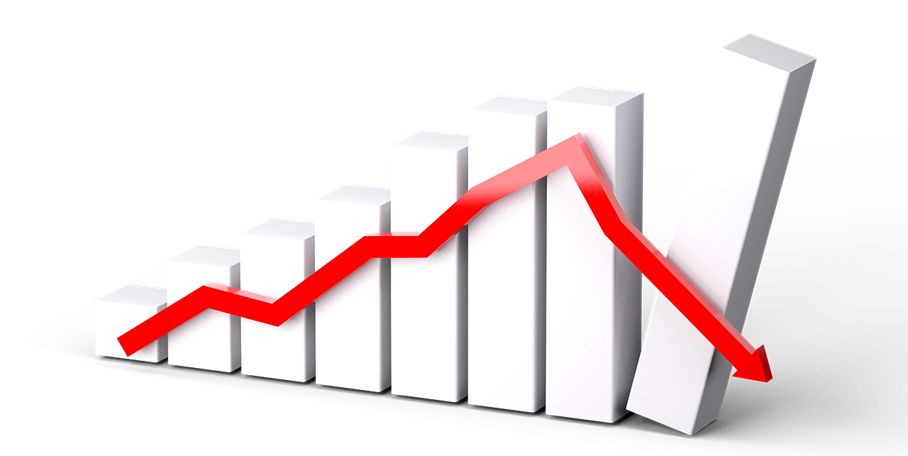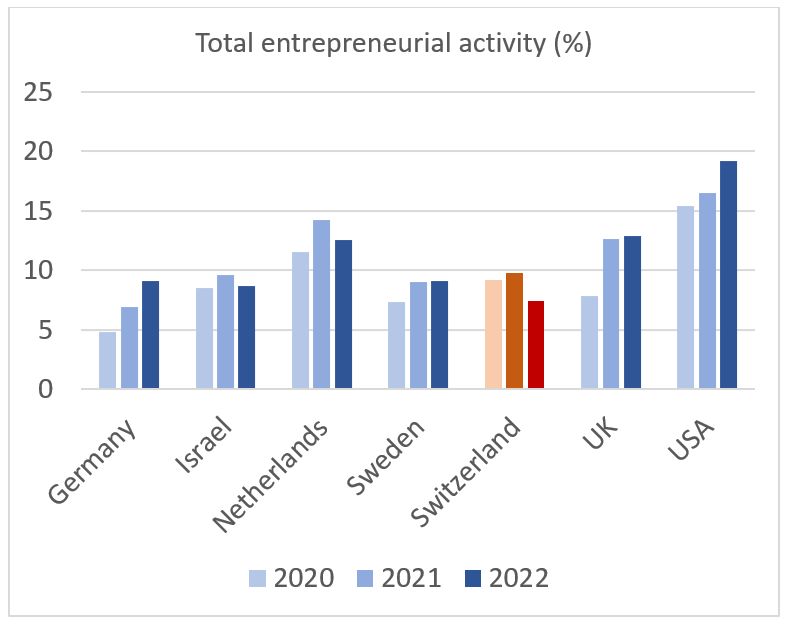
The global pandemic had a mixed effect on entrepreneurship across the world, according to the 2022/2023 Global Entrepreneurship Monitor (GEM) Global Report: Adapting to a “New Normal” which was launched today at HEG-Fribourg. Switzerland is among the clear losers.
Based on interviews with over 175,000 individuals and experts from 51 economies, the Global Entrepreneurship Monitor tracks the percentage of adults who are starting or running a new business (referred to as Total early-stage Entrepreneurial Activity or TEA).
The results for Switzerland are sobering. Total entrepreneurial activity fell significantly in 2022 from 9.8% (2021) to 7.4%. This rate was well behind that of comparable countries such as Israel (8.7%), Sweden (9.1%) or the Netherlands (12.5%). In Sweden, the rate was stable compared to the previous year. In Israel and the Netherlands, the TEA also decreased, but less than it did here.
Switzerland also performs poorly in comparison with all 51 countries covered by the GEM. In terms of entrepreneurial activity, it is only ranked 38th, compared to 25th and 26th in previous years.

Moreover, Switzerland lags behind not only in quantity but also in quality. In its survey, the GEM also identifies that part of the founders who are aiming for faster growth or want to internationalise. Switzerland scores poorly on both criteria. In terms of the share of founders with ambitious growth plans, it ranks 46th. In 2021, Switzerland had achieved 18th place. In terms of internationalisation Switzerland ranks 17th (2021: 10th). In terms of internationalisation, better rankings are held, for example, by the Netherlands (7th), Israel (12th), Sweden (13th) and also Germany (8th).
Gender gap less wide
In Switzerland, the entrepreneurial activities of male founders have declined much more than those of female founders. For male founders, the TEA rate fell from 12.3% in 2021 to 8.4% in 2022, for female founders from 7.2% in 2021 to 6.3%. As a result, Switzerland has significantly improved its position compared to other countries. In 2002, it was ahead of the UK, Israel, Sweden and Germany.
Good framework conditions with weaknesses
In addition to the survey on entrepreneurial activities, the GEM also includes a ranking of the countries according to the quality of the entrepreneurial environment called National Entrepreneurship Context Index (NECI). At least 36 experts, often more, are selected for their expertise by the GEM National Team and approved by GEM to assess statements that make up the scores.
In pre-pandemic 2019, Switzerland topped the then new league table of entrepreneurial framework overall scores with a score of 6.1. The pandemic period resulted in some deterioration in that score to 5.4 (10th) in 2020, and to 5.5 in 2021 (ninth). 2022 marked something of a recovery in Switzerland’s overall score: to 5.8. Improvements in the entrepreneurial environment scores of other economies, however, meant that Switzerland only ranked eighth of the 51 GEM economies in 2022.
Switzerland continues to have its overall score dragged down by poor scores for Entrepreneurial Education at School and for Ease of Entry: Market Dynamics. In the latter Framework Condition, Switzerland ranked 45th of 51 economies, in stark contrast to the 10 Framework Conditions for which it ranked 10th or better.
“In an economy in which six Framework Conditions scored 6 or more, scoring 3.8 for Ease of Entry: Market Dynamics and 3.6 for Entrepreneurial Education at School is both problematic and inconsistent,” said Rico Baldegger, Director and Professor of Strategy, Innovation and Entrepreneurship at the School of Management Fribourg (HEG-FR), Switzerland and head of the GEM Switzerland Team.
Access the full report at https://www.gemconsortium.org/reports/latest-global-report.























































Please login or sign up to comment.
Commenting guidelines